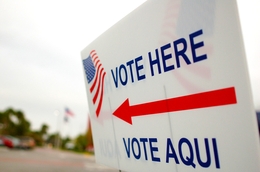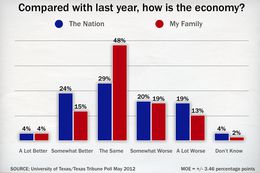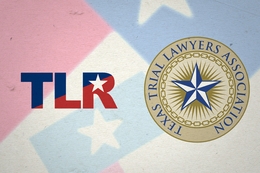
Texas Weekly's Final Pre-Primary Hot List
Time to reclaim your mailbox, your television, your home phone. The long-delayed Texas primary elections are finally here.
Full Story
Time to reclaim your mailbox, your television, your home phone. The long-delayed Texas primary elections are finally here.
Full Story
The high points from the latest University of Texas/Texas Tribune Poll.
Full Story
Trial lawyers, the most reliable and generous source of cash for Texas Democrats, generally sit out Republican primaries. But this year the are pouring huge sums into key Senate races, hoping to elect Republicans who are more friendly to their agenda than the establishment-preferred GOP candidates.
Full Story
In one form or another, the SD-25 race will assuredly extend beyond May 29. If it doesn't go into a run-off, as at least one candidate predicts, it will likely continue in the courtroom.
Full StoryThe Texas Department of Transportation is urging Congressional leaders to give states more discretion in charging tolls and using private funding for road projects.
Full StoryJim Henson, c0-director of the University of Texas/Texas Tribune Poll, talks about the main points and what they mean going into next week's primary elections.
Full StoryFor this week's nonscientific survey of political and government insiders, we asked some questions from the latest UT/TT poll about the economy, the state of the state and the country, and the most important problems ahead.
Full Story
Key meetings and events for the coming week.
Full StoryI'm too old and too set in my ways. I'm a fiscal and social conservative. I have zero desire to go along to get along.
U.S. Senate candidate David Dewhurst, talking up his bona fides on Houston's KPRC radio
If the race tightens, Kelly, a male, will still have the advantage of a female name. It may be the only time in his life he is glad his parents named him Kelly.
Lobbyist Robert Miller, analyzing the SD-9 Republican primary between Kelly Hancock and Todd Smith
There’s just a huge misconception … within the Romney campaign that Texas will just go Republican no matter what.
Texas GOP Chairman Steve Munisteri, in The Dallas Morning News
She is running on her father’s reputation and now on his money. They are going to buy this race if they can because they have an endless supply of money.
Railroad Commission candidate Warren Chisum, quoted in the Lubbock Avalanche Journal on opponent Christi Craddick
One of my great concerns about this upcoming election [is] we have individuals who are running in Republican primaries who do not have pro-life positions.
Rick Perry in a conference call Tuesday with the Texas Right to Life PAC
This is the roughest campaign that I've been involved in.
Rep. Rob Eissler, R-The Woodlands, on his primary race against Steve Toth
I've been screaming about David Bradley for 12 years. I was not going to give him a free pass. He might beat me, but he was going to have to work for it.
State Board of Education candidate Rita Ashley, who is running against veteran member David Bradley, a Beaumont Republican
He never phoned, he never emailed and he never asked me about it at all. Had he done that it could have been cleared up.
State Sen. John Carona, R-Dallas, on his ongoing email feud with state Sen. Dan Patrick, R-Houston
New reporting from the Census Bureau shows Texas to be one of five states in the nation where minority groups account for more than 50 percent of the population. The numbers also indicate that this is a trend that will likely continue, as the amount of non-white Hispanic children has decreased from 43 percent to 34 percent of the population. Without the increase in minority children, the state’s demographer said, Texas' declining birth rate would lead to shrinking economic growth.
Taking up a dispute that will affect the future of public beaches in Texas, a federal appeals court ruled the state Open Beach Act unconstitutional. The case stemmed from hurricane damage in Galveston, which led to a sudden erosion of the beach and left homeowner Carol Severance in the unexpected position of needing to remove her house from the newly public beach. Overturning the state’s decision, the 5th Circuit Court of Appeals declared that seizing the house would be a violation of Severance’s protection against unreasonable search and seizure.
Attorney General Greg Abbott will allow state lawmakers to be deposed in the state's voter ID case. The suit contesting the new law is set for trial July 9 and had faced delays as state officials objected to the volume of information requested by the Justice Department and opposed plans to question lawmakers about their roles in passing the disputed legislation. Abbott hopes to have the law approved by the federal government in time for November’s election.
Texas doesn’t track cases of voter fraud, but Attorney General Abbott cited a Fort Worth indictment of a Democratic activist as evidence that the state suffers from an abundance of cheating at the polls. Hazel Woodward James, a candidate for Democratic precinct chairman in Tarrant County, was accused of having her son vote in his father’s place, though his father voted later in the day. Abbott touted the case as an example of the need to enforce the state’s new voter ID law, which is hung up in federal court.
Following the enactment of a new law in September designed to organize and register DNA results collected in rape kits, the state agency in charge is reporting a backlog of untested kits. The Texas Department of Public Safety is in charge of maintaining the records of law enforcement agencies and reports that more than 12,000 kits statewide are being stored without being tested. Lack of funding is the culprit; DPS spends about $800 on each tested kit, while private labs can charge more than $5000 for an analysis of the evidence.
The Texas Department of Criminal Justice was directed to release the names and suppliers of its lethal injection drugs after it objected to providing the information. Two different newspapers asked the department in February to provide details about its death penalty protocol, but the department declined, arguing that to do so could endanger employees and compromise its supply. The attorney general’s office disagreed, saying the state must supply the information.
A new report from the Electric Reliability Council of Texas predicts that with the state’s continued growth, the capacity to produce enough power will fall short within 10 years. The reserve margin that ERCOT maintains will drop over the course of the next decade in response to high summertime temperatures and population growth, potentially causing statewide blackouts. ERCOT intends to issue another report next week to outline steps the state can take to improve the bleak forecast.
Officials in Williamson County are trying to avoid having a salamander species living in their area being placed on the endangered species list. County commissioners are asking the U.S. Fish and Wildlife Service for time to conduct their own study analyzing whether the salamander can flourish in spite of the tremendous development in the county. If the agency proposes listing the species as endangered early this summer, the public will be given a 60-day comment period.
David Schenck, deputy Texas attorney general for legal counsel, is taking a post with Dykema and will work in the litigation division in that law firm's Dallas office.
Gov. Rick Perry appointed John Swanson of Frisco to the Texas Mutual Insurance Company Board of Directors. Swanson is president and CEO of Republic Energy Inc. Perry also appointed T. Craig Benson of Austin to the Interagency Council for Genetic Services. Benson is president of Myriad RBM Inc. and founding director of the Beyond Batten Disease Foundation.
House Speaker Joe Straus appointed Dallas attorney and business consultant Tom Luce to the Cancer Prevention and Research Institute of Texas Oversight Committee. Luce was a founding partner and managing partner of the law firm of Hughes & Luce, LLP until his retirement from the firm in 1997.
Deaths: Former Rep. Ernestine Glossbrenner, D-Alice, a high school math teacher who became chairwoman of the House Public Education Committee. She was 79.

